Date: Thursday, 18 April 2019
Time: 11:00-18:30
Room: C1058
Track Description
Agricultural technologies are used across the entire agri-food supply chain – from the planting of seeds to the harvesting of crops, breeding livestock and treating disease, transporting goods and managing commercial sales, agri-tech has a role to play at every stage. Agricultural science and technology is rapidly becoming one of the world’s fastest growing and exciting markets. It is driven by global changes: a rising population, rapid development of emerging economies with western lifestyle aspirations and growing geopolitical instability around shortages of land, water and energy. A technology revolution is also taking place. Breakthroughs in nutrition, genetics, informatics, satellite imaging, remote sensing, meteorology, precision farming and low impact agriculture mean agri-tech has huge potential for development. Also, the scale of farming worldwide has changed significantly in recent years, with a move towards larger, intensive, profit-driven enterprises due to market pressures. This has resulted in demand for cost and labour reducing advanced farm automation technologies which can increase farm productivity. This step change has resulted in a demand for technologies and equipment which can reduce costs and labour inputs with concurrent increases in capacity to provide economies of scale. These economies of scale however will not yield profit unless quality is maintained and this is a central focus of any new technologies developed for the sector. The WF will explore how IoT technologies contribute to address all of these challenges through improvements in yield and efficiency. There is a rich heritage of agriculture in Ireland & Ireland’s agri-food sector, in particular is flourishing. Exports & research and innovation have been identified as the twin catalysts for the success of Irish agri-food and agri-tech companies.
Schedule
11:00-13:00 Session 1, IoT in Diary and Livestock
Talk 1 “IoT on the Dairy Farm”, Edmond Harty, CEO DairyMaster, and University College Dublin, Ireland
Talk 2 “Towards Integrated Precision Livestock Farming with the IoT”, Tomas Norton, Precision Livestock Farming (PLF), KU Leuven, Belgium
Talk 3 “Internet of Things Animal Health Services Platform for Precision Farming”, Ivan Andonovic, University of Strathclyde, Glasgow
Panel Discussion
13:00-14:00 Lunch
14:00-16:00 Session 2, IoT in Precision Ag
Talk 4 “Digital Transformation in Agriculture”, Atif Khan, Climate Corporation
Talk 5 “The Role of Precision Agriculture in Achieving a ‘Circular Economy’ Across the Agri-Food Sector”, Shane Ward, University College Dublin, Ireland
Talk 6 “Fog Analytics in Precision Farming”, Stepan Ivanov, Waterford Institute of Technology, Ireland
Panel Discussion
16:00-16:30 Coffee Break
16:30-18:30 Session 3, IoT and Bio-Economy
Talk 7 “VistaMilk – Precision Dairying from Soil to Society”, Donagh Berry, Teagasc – The Agriculture and Food Development Authority, Moorepark, Ireland
Talk 8 “IoT and Agriculture; A Start-Up Perspective”, David McDonnell, Anuland, Ireland
Talk 9 “Agri-Digitalisation – Shaping & Creating Development”, Patrick Barrett, Department of Agriculture, Food and Marine, Ireland
Talk 10 “Digital Innovation Hubs: Enablers of the Transition Low Carbon Economy?” Helena McMahon, Shannon Applied Biotechnology Research Centre Institute of Technology, Tralee, Ireland
Panel Discussion
Wrap-up and Summary
Track Co-Chairs
Mehmet Can Vuran, University of Nebraska – Lincoln
Mehmet Can Vuran was born in Istanbul, Turkey. He received his B.Sc. degree in Electrical and Electronics Engineering from Bilkent University , Ankara, Turkey in 2002. He received his M.S. and Ph.D. degrees in Electrical and Computer Engineering from the Broadband and Wireless Networking Laboratory, School of Electrical and Computer Engineering, Georgia Institute of Technology, Atlanta, GA. in 2004 and 2007, respectively, under the guidance of Prof. Ian F. Akyildiz.
Currently, he is the Susan J. Rosowski Associate Professor of Computer Science and Engineering at the University of Nebraska-Lincoln. Dr. Vuran was recognized as a Highly Cited Researcher three years in a row in 2014, 2015, and 2016 by Thomson Reuters “in recognition of ranking among the top 1% of researchers for most cited documents in Computer Science”. Dr. Vuran was awarded an NSF CAREER award for the project “Bringing Wireless Sensor Networks Underground“. He is a Daugherty Water of Food Institute Fellow.
Joe Walsh, Institute of Technology, Tralee
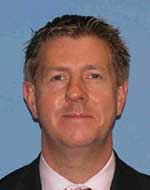 Joseph Walsh is a Professor and Head of the School of STEM and Head of Intelligent Mechatronics and RFID (IMaR) Research Centre at the Institute of Technology, Tralee (ITT), Co Kerry, Ireland. Professor Walsh’s research experience encompasses the field of intelligent mechatronics and sensors, dairy technology, robotics and automation, autonomous systems, bio‐instrumentation and STEM education and is well published in these areas. He has over 20 years research and development experience in both industry and academia and has (co-)authored over 100 scientific articles and has received circa. 10 million in research funding over the past 5 years. He is involved in a number of Irish national collaborative research centres, LERO the Irish Software Research and the CONFIRM Centre for Smart Manufacturing. He has also been active in many EU funded research projects and coordinated the FP7 Rotabot project on next generation milking parlours. He has a Ph.D in Electronic Engineering from the University of Limerick and an M.Sc (Eng) in Bio‐engineering jointly from Trinity Collage Dublin (TCD), University College Dublin (UCD) and the University of Limerick (UL). Professor Walsh was elected Fellow of the Institute of Physics (FinstP) and is a corporate member of the Institution of Engineers of Ireland (MIEI). He was been awarded the titles of Chartered Engineer and Chartered Physicist. He currently leads a number of targeted projects with Dairymaster, Bons Secours Hospital Group, Liebherr and Kosta
Joseph Walsh is a Professor and Head of the School of STEM and Head of Intelligent Mechatronics and RFID (IMaR) Research Centre at the Institute of Technology, Tralee (ITT), Co Kerry, Ireland. Professor Walsh’s research experience encompasses the field of intelligent mechatronics and sensors, dairy technology, robotics and automation, autonomous systems, bio‐instrumentation and STEM education and is well published in these areas. He has over 20 years research and development experience in both industry and academia and has (co-)authored over 100 scientific articles and has received circa. 10 million in research funding over the past 5 years. He is involved in a number of Irish national collaborative research centres, LERO the Irish Software Research and the CONFIRM Centre for Smart Manufacturing. He has also been active in many EU funded research projects and coordinated the FP7 Rotabot project on next generation milking parlours. He has a Ph.D in Electronic Engineering from the University of Limerick and an M.Sc (Eng) in Bio‐engineering jointly from Trinity Collage Dublin (TCD), University College Dublin (UCD) and the University of Limerick (UL). Professor Walsh was elected Fellow of the Institute of Physics (FinstP) and is a corporate member of the Institution of Engineers of Ireland (MIEI). He was been awarded the titles of Chartered Engineer and Chartered Physicist. He currently leads a number of targeted projects with Dairymaster, Bons Secours Hospital Group, Liebherr and Kosta
Track Speakers
Ivan Andonovic
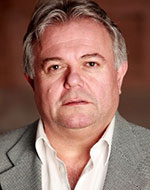 I. Andonovic, Professor of Broadband Networks, BSc, PhD joined the Department of Electronic and Electrical Engineering Strathclyde in 1985 following several years in the defence industry. He held a two-year Royal Society Industrial Fellowship, in collaboration with British Telecommunications (BT) Labs during which he investigated novel approaches to broadband networking. He has edited two books and authored/co-authored six chapters in books and over 380 journal and conference papers, secured funding in excess of £10M and has supervised over 30 successful PhD students. He was a member of flagship Scottish Enterprise (Government agency for economic growth) establishment team of the Intermediary Technology Institutes (ITIs), aimed at bridging the gap between basic research and company growth; he held the ITI Techmedia Chair facilitating the interaction between fundamental research in communications technologies and pre-competitive development of solutions that formed the input to commercialisation activities in Scotland. He is a co-founding member, Director and CTO of Silent Herdsman Ltd (acquired by Afimilk), a technology company providing a range of cloud based animal health services, the foundation data being acquired through a highly scalable wireless sensor platform. He has been Visiting Scientist at the Communications Research Laboratories of Japan, Visiting Professor at the City University of Hong Kong and Princeton University, USA, Topical Editor for the ‘IEEE Transactions on Communications’ and was Technical Programme Co-Chair for the ‘IEEE International Conference in Communications (ICC07)’. Prof. Andonovic is a Fellow of the IET and holds Senior Member status within the IEEE.
I. Andonovic, Professor of Broadband Networks, BSc, PhD joined the Department of Electronic and Electrical Engineering Strathclyde in 1985 following several years in the defence industry. He held a two-year Royal Society Industrial Fellowship, in collaboration with British Telecommunications (BT) Labs during which he investigated novel approaches to broadband networking. He has edited two books and authored/co-authored six chapters in books and over 380 journal and conference papers, secured funding in excess of £10M and has supervised over 30 successful PhD students. He was a member of flagship Scottish Enterprise (Government agency for economic growth) establishment team of the Intermediary Technology Institutes (ITIs), aimed at bridging the gap between basic research and company growth; he held the ITI Techmedia Chair facilitating the interaction between fundamental research in communications technologies and pre-competitive development of solutions that formed the input to commercialisation activities in Scotland. He is a co-founding member, Director and CTO of Silent Herdsman Ltd (acquired by Afimilk), a technology company providing a range of cloud based animal health services, the foundation data being acquired through a highly scalable wireless sensor platform. He has been Visiting Scientist at the Communications Research Laboratories of Japan, Visiting Professor at the City University of Hong Kong and Princeton University, USA, Topical Editor for the ‘IEEE Transactions on Communications’ and was Technical Programme Co-Chair for the ‘IEEE International Conference in Communications (ICC07)’. Prof. Andonovic is a Fellow of the IET and holds Senior Member status within the IEEE.
Talk Title: Internet of Things Animal Health Services Platform for Precision Farming
The features of an Internet of Things (IoT)-inspired platform with the capability to provision of a range of services that promote the adoption of Precision Farming (PF) principles is detailed. The platform design targets the provision of dairy animal health services and comprises a robust, wirelessly enabled, high node-count sensor network gathering data from individual animals and a cloud based environment that manages on-farm data to pro-actively inform the supply chain, real time, on key operational and management interventions. The platform is scalable in terms of the number of animals, farms of any size and has the flexibility to extend its service mix to other non-dairy environments such as beef and crops farming. The presentation reports on the design of the elements and features of the physical layer and details the methodology of feature extraction from raw acceleration data, a single (proxy) measurement that is the basis for the interpretation of a spectrum of cow states, the statistics of which in turn yield key animal conditions. Accurate indications of the onset of heat, important in increasing the fertility of individual animals and hence the overall productivity of dairy farms and the time spent eating and ruminating, both indicators of health state are provisioned.
Patrick Barrett
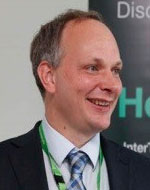 Patrick Barrett is an Agricultural Inspector in the Research Division with the Department of Agriculture, Food & Marine. He is the National Contact point for the EU Research & Innovation funding programmes in relation to Agriculture, Rural Economy & Bioeconomy. He is part of the secretariat for the National Bioeconomy Implementation Group and for the Food Wise 2025 High Level Innovation Team. Email: Patrick.Barrett@agriculture.gov.ie
Patrick Barrett is an Agricultural Inspector in the Research Division with the Department of Agriculture, Food & Marine. He is the National Contact point for the EU Research & Innovation funding programmes in relation to Agriculture, Rural Economy & Bioeconomy. He is part of the secretariat for the National Bioeconomy Implementation Group and for the Food Wise 2025 High Level Innovation Team. Email: Patrick.Barrett@agriculture.gov.ie
Talk Title: Agri-Digitalisation – Shaping & Creating Development
The topics covered are as follows: Digital technologies can support Irish farmers in providing safe, sustainable and quality food. Digitisation can also improve working conditions for farmers and reduce the environmental and climate impacts of agriculture. In order to make use of the full potential of digitisation in the farming sector, a number of areas of intervention have been identified: national research and innovation strategy and funding developments; availing of EU research and innovation funding and engagement in EIP-AGRI; and also preparations for the next CAP and engagement with other EU Member States on agri-digitalisation.
Bobby Brauer
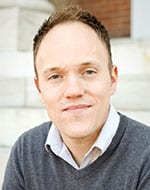 Bobby grew up in rural Nebraska, where his first jobs were detasseling corn, rogueing beans, irrigating and driving tractors. He has a background in agricultural engineering and computer science, and has spent his 10 years at Bayer Crop Science in various R&D roles focused on field operations, logistics, software, geospatial science and engineering. He currently leads the digital phenotyping team in global breeding, focused on developing models and delivering insights and science at scale from imagery and sensor data.
Bobby grew up in rural Nebraska, where his first jobs were detasseling corn, rogueing beans, irrigating and driving tractors. He has a background in agricultural engineering and computer science, and has spent his 10 years at Bayer Crop Science in various R&D roles focused on field operations, logistics, software, geospatial science and engineering. He currently leads the digital phenotyping team in global breeding, focused on developing models and delivering insights and science at scale from imagery and sensor data.
Talk Title: How field automation, sensing, and IoT are enabling tailored solutions for every acre at Bayer Crop Science
Farmers make about 40 big decisions every season, and every acre on their farm is unique. Weather, soil, nutrition, microbiome, plant genetics, pests and crop protection all result in unique performance. Ensuring the sustainability of a healthy food supply in the midst of growing population and changing environment depends on developing tailored solutions for every acre and every big decision. At Bayer Crop Science, a critical part of developing these tailored solutions is using IoT and automation in the large scale field testing of our products. This transformation in technology is enabling us to sample every key environment and leverage high resolution data on the unique characteristics of every acre, every plant, and every seed. This talk will tell the story of how we have transformed field testing with IoT and automation, and the importance of hi-resolution data and real time decisions to developing products for the farm of the future.
Donagh Berry
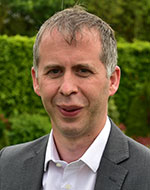 Donagh Berry is a statistical geneticists at Teagasc, Moorepark (www.teagasc.ie) and director of the VistaMilk SFI Research Centre (www.vistamilk.ie); he holds professorship appointment at several (inter)national institutes. Following his bachelor degree in Agricultural Science at University College Dublin, Ireland, he undertook a PhD in dairy cattle genetics in Wageningen University, the Netherlands. In his Teagasc capacity, he is responsible for the research on genetics in dairy cattle and is responsible for the development and implementation of genomic evaluations in dairy cattle, beef cattle and sheep in Ireland. As Director of VistaMilk, he leads a team of > 200 scientists in the development and deployment of digital technologies in precision dairy production.
Donagh Berry is a statistical geneticists at Teagasc, Moorepark (www.teagasc.ie) and director of the VistaMilk SFI Research Centre (www.vistamilk.ie); he holds professorship appointment at several (inter)national institutes. Following his bachelor degree in Agricultural Science at University College Dublin, Ireland, he undertook a PhD in dairy cattle genetics in Wageningen University, the Netherlands. In his Teagasc capacity, he is responsible for the research on genetics in dairy cattle and is responsible for the development and implementation of genomic evaluations in dairy cattle, beef cattle and sheep in Ireland. As Director of VistaMilk, he leads a team of > 200 scientists in the development and deployment of digital technologies in precision dairy production.
Talk Title: VistaMilk – Precision Dairying from Soil to Society
The €40m VistaMilk Centre, with a team of >200 scientists, aims to be an agent of growth for the Irish dairy industry by being a world leader in fundamental and translational research for precision pasture-based dairying. Internationally, the advances developed in the centre will apply to dairy systems in many countries and will be a catalyst for global growth in the Agri-Tech sector. The VistaMilk Centre represents a unique collaboration between Agri-Food and information communications technology (ICT) research institutes and leading Irish/multinational food and ICT companies. The vision of the VistaMilk Centre is to be a world leader in the Agri-Food technology sector through innovation and enhanced sustainability across the dairy supply chain, positively impacting the environment, animal well-being and the health of consumers. This will be achieved by greatly improving the soil to gut supply chain connectivity, thereby improving resource efficiency, better meeting consumers’ expectations and improving profitability and resilience. To achieve the vision for the centre, the resources, capabilities and expertise of the partners will be brought together, to create new innovation opportunities at the interface between Agri-Food and ICT. It will, for the first time, link the Irish Agri-Food industry with Ireland’s leading technology research institutes in a large-scale innovation ecosystem. The opportunities that arise at the interface between Agri-Food and ICT will be the basis for the competitive advantage and international reputation of the centre.
Edmond Harty
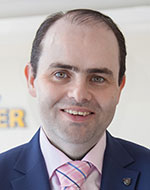 Prof. Edmond Harty is CEO of Dairymaster, one of the leading dairy innovation and technology companies in the world. The Dairymaster philosophy is to be the best in the world at what they do.
Prof. Edmond Harty is CEO of Dairymaster, one of the leading dairy innovation and technology companies in the world. The Dairymaster philosophy is to be the best in the world at what they do.
Prof. Harty has a strong background in both academia and engineering. He holds a B.Eng in Mechanical Engineering from UL and a Ph.D from UCD. He is full Adjunct Professor in the School of Biosystems and Food Engineering at UCD College of Engineering and Architecture.
He has won numerous business awards. He was the overall winner of Ernst & Young Entrepreneur of the Year. Through his vision and direction Dairymaster were awarded many innovation and technology awards across the globe. Dairymaster was also awarded at the Agribusiness Awards and Prof. Harty was announced as the inaugural winner of the Agribusiness Leader Award. He was also named Global Innovator at the Animal Health All-star awards. He received the Parsons medal from the Irish Academy of Engineering who awards the Parsons Medal for Engineering Sciences to engineers or engineering scientists of exceptional ability in research and engineering technology.
Prof. Harty’s concentration is always on future possibilities, scientifically developed and proven. The level of patent applications (over 100 so far) speaks to his commitment to innovation.
Talk Title: “IOT on the Dairy Farm!”
Farming systems and agriculture practices are in an accelerated phase of development. Advances in crop growth, yield modelling and global navigation systems have led to “Precision Agriculture”. The deployment of digital technologies such as remote sensing, cloud computing and the internet of things has extended precision agriculture to the next generation of farming practice, “Smart Farming”. In parallel, the food manufacturing and distribution sectors have benefited from the emergence of the Smart Factory of Industry 4.0 which has emerged due to the increased adoption of Internet of Things (IoT) and Cyber-Physical Systems (CPS).
The digital and sensing technologies underpinning Smart Farming and Food Industry 4.0 harness the power of digitisation to continuously monitoring the farm/factory environment. This enables monitoring of operations at an unprecedented level of detail across a multitude of performance measures and characteristics. Integration of parameters on situation and location awareness into the decision making process significantly enhances task management performance. Today, many farmers are already using technologies such as smartphones, tablets, in- field sensors, drones and satellites which enable remote soil conditions, livestock and crop monitoring. Analysing the data provides insight into likely future crop patterns, animal health and welfare which enables more effective and efficient planning. Potential benefits may include improved crop yields and animal performance, optimisation of process inputs and labour reduction. The impact of this is the delivery of farms and enterprises that are more efficient, productive and profitable and advancing towards the goal of sustainable intensification. In parallel, technologies such as the internet of things (IoT), artificial intelligence, robotics and big data analytics are stimulating the creation of new products and services.
This talk will focus in particular on IOT on the dairy farm.
Stepan Ivanov
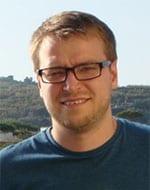 Stepan has almost 10 years of research experience in the area of ICT. Stepan received a Ph.D. in Computer Science from Waterford Institute of Technology, Ireland, where he has been employed as a postdoctoral researcher in the Telecommunications Software and Systems Group (www.tssg.org) since. During that time he was a principal investigator of a commercially-focused project funded by Enterprise Ireland agency and is currently a technical/research lead on a basic research project that builds an IoT solution for Future Dairy Farming. Stepan’s research interests lay in the areas of general-purpose wireless networks, Internet of Things and finally Fog Computing. Stepan has published multiple peer-reviewed conference and journal publications in these areas. Stepan serves as a reviewer for various international conferences and journals.
Stepan has almost 10 years of research experience in the area of ICT. Stepan received a Ph.D. in Computer Science from Waterford Institute of Technology, Ireland, where he has been employed as a postdoctoral researcher in the Telecommunications Software and Systems Group (www.tssg.org) since. During that time he was a principal investigator of a commercially-focused project funded by Enterprise Ireland agency and is currently a technical/research lead on a basic research project that builds an IoT solution for Future Dairy Farming. Stepan’s research interests lay in the areas of general-purpose wireless networks, Internet of Things and finally Fog Computing. Stepan has published multiple peer-reviewed conference and journal publications in these areas. Stepan serves as a reviewer for various international conferences and journals.
Talk Title: Fog Analytics in Precision Farming
In agriculture, the use of IoT is strongly advocated for under the umbrella of Precision Farming. Today, substantial amount of research is focused on developing efficient IoT solutions that will ensure comprehensive monitoring of the farm environment. In future, accurate and timely analyses of the data collected by these systems will become paramount for agriculture. Meaningful insight provided by these analyses will play a crucial role in increasing efficiency and sustainability of the farming. Conventionally, analyzing monitoring data is considered to be responsibility of Big Data and Cloud technologies, and, therefore, carried out remotely. Meanwhile, over the last number of years, design of IoT devices has improved dramatically. Modern devices have computational capacity that is sufficient for certain data-analytics functionality. In recognition of that, IoT has seen the emergence of the Fog Computing paradigm. Computational resources available at the network Edge are proposed to host a variety of originally cloud-only services. Data analysis are one of the examples of such services. In this talk Dr. Ivanov will give an overview of the recent Fog-Analytics techniques that have been recently proposed by the research society. Particular attention will be dedicated to the use of the techniques in the context of modern Agriculture, specifically Precision Farming. The talk will predominantly focus on the light-weight techniques suitable for execution on board of such extremely computationally-limited devices as wireless sensors and actuators.
Atif Khan
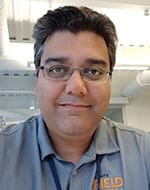 Mr. Atif Khan has been working at Bayer Crop Science since 2015 and is currently a Senior Manager for Connected Systems and IoT within the digital agricultural arm of the company called The Climate Corporation. In this role Mr. Khan leads a group of software/telematics engineers and data scientists to generate and capture agronomic data layers that are then analyzed to provide prescriptions to farmers on when and where to plant, treat, and harvest. Prior to his current role, Mr. Khan had been working in automation and robotics for 13 years in Production Engineering (Mining and Agriculture).
Mr. Atif Khan has been working at Bayer Crop Science since 2015 and is currently a Senior Manager for Connected Systems and IoT within the digital agricultural arm of the company called The Climate Corporation. In this role Mr. Khan leads a group of software/telematics engineers and data scientists to generate and capture agronomic data layers that are then analyzed to provide prescriptions to farmers on when and where to plant, treat, and harvest. Prior to his current role, Mr. Khan had been working in automation and robotics for 13 years in Production Engineering (Mining and Agriculture).
Talk Title: Digital Transformation in Agriculture
Agriculture was Industry 1.0 and it’s rather ironic, that it’s one of the last sectors to be truly transformed by the movements of the 4th Industrial Revolution. In many ways, agriculture is a manufacturing process where the majority of the variables are out of your control. It’s this variability of input that makes agriculture ‘fertile ground’ for disruption in the IoT space. This talk will be geared towards how one knows that their industry is in the midst of a digital transformation. Today agriculture is in the midst of one and it is an exciting time to be working at Bayer Crop Science’s industry-leading digital arm, The Climate Corporation (TCC). Mr. Khan will shed some light on how TCC is leveraging equipment data and sensors (proximal and remote) to develop cutting-edge algorithms to better prescribe farmers on how to achieve optimal yields.
What are the similarities between manufacturing and farming?
How do we deal with unpredictability in the past?
General discussion around Digital Transformation within Agriculture
How is The Climate Corporation positioned to be a leader in this space?
How is IoT fueling R&D at the Climate Corporation?
Disrupting by Connecting
David McDonnell
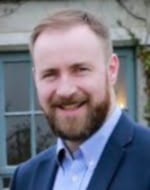 David McDonnell is the founder of agricultural technology start-up, Anuland.
David McDonnell is the founder of agricultural technology start-up, Anuland.
David began his professional life as a farmer, and still continues to be involved. He assists with the management of the family farm, a 400 cow dairy and poultry business, with his brother Richard and father Michael. A little over 20 years ago, David began to diversify into complementary farm activities, developing a number of renewable energy projects, notably a 1MW Anaerobic Digestion plant and numerous wind farms. He is a member of the Irish Wind Energy Association, Irish BioEnergy Association and Cré.
Anuland has developed from an intersection of farming experience and renewable energy development. Anuland is focused on being farmer centric, and empowering the farmer with technology to utilise known scientific data to meet the needs of their specific farm environment, enabling the farmer to strive for the triple bottom line of financial, environmental and social sustainability.
David holds his Green Cert in Agriculture from Salesian Agricultural College Pallaskenry, a Degree in Psychology and a Masters in Business Administration from University of Limerick.
Talk Title: IoT and Agriculture; A Start-Up Perspective
Around the world awareness is growing for the need for sustainable agriculture to protect the environment and secure food supply. There is increasing acceptance that current industrial and agricultural practices will drastically change the climate to the detriment of all species on earth if those practices continue on their current trajectory. The challenge is there to sustainably feed the growing population on our planet.
Today’s young farmers want to optimise production in a sustainable profit-efficient manner. Many are turning to technology to help them, and it is widely acknowledged that IoT in Agriculture plays an important role in this. However, there is huge variability in farming practices across the world. Technology needs to understand its end customer. In agriculture that is the farmer.
Farmers are concerned about Legacy. It can take several generations of farmers to understand and gain in-season data on their land. The role of IoT, Sensors & Sensor Systems should help in understanding data derived from the land and if done right the rewards are great. This presentation will look at how agriculture is using sensors and sensor systems, the importance of the farmer, and the challenges faced in adoption of new sensors and systems.
Helena McMahon
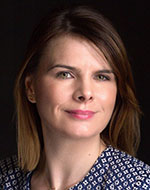 Dr. Helena McMahon is a Principle Investigator at Shannon Applied Biotechnology Research Centre Institute of Technology Tralee. Research interest in the circular bioeconomy, in the exploitation and commercialization of biobased products derived from terrestrial and marine biomass, targeting functional foods, cosmeceuticals and regenerative medicine applications. EU level RDI activities focused in multi and inter-disciplinary projects integrating digitization, design, and business model and innovation ecosystem system approaches for the advancement of the circular bioeconomy.
Dr. Helena McMahon is a Principle Investigator at Shannon Applied Biotechnology Research Centre Institute of Technology Tralee. Research interest in the circular bioeconomy, in the exploitation and commercialization of biobased products derived from terrestrial and marine biomass, targeting functional foods, cosmeceuticals and regenerative medicine applications. EU level RDI activities focused in multi and inter-disciplinary projects integrating digitization, design, and business model and innovation ecosystem system approaches for the advancement of the circular bioeconomy.
Talk Title: Digital Innovation Hubs: Enablers of the Transition Low Carbon Economy?
ICT-BIOCHAIN has created Europe’s first two Digital Innovation Hubs (DIH) for the bioeconomy. These DIHs bring together technology developers and industry networks within test bed regions to deploy ICT, IoT and Industry 4.0 to optimize availability and mobilization of competitively priced biomass for the development of new agri-food or forestry value chains.
Tomas Norton
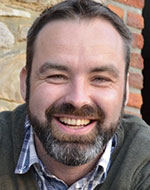 Tomas Norton is a tenure-track assistant professor in Precision Livestock Farming (PLF) in the group of M3-BIORES (Measure, Model, Manage Bio-responses) at the KU Leuven. He holds a PhD in Biosystems Engineering from University College Dublin (Ireland). His current research focus is on PLF applications, focussing on real-time modelling and control of animal bio-responses. He is PI and co-PI on collaborative National and International projects funded by the Belgium government and USA. He is coordinator of courses on Measuring, Modelling and Managing Bio-responses and Sustainable PLF, and Animal Production Engineering at the KU Leuven. Since 2018 he is associate editor of Computers and Electronics in Agriculture (COMPAG) and Chair of Section 2 of International Commission of Agricultural and Biosystems Engineering (CIGR). Email: tomas.norton@kuleuven.be
Tomas Norton is a tenure-track assistant professor in Precision Livestock Farming (PLF) in the group of M3-BIORES (Measure, Model, Manage Bio-responses) at the KU Leuven. He holds a PhD in Biosystems Engineering from University College Dublin (Ireland). His current research focus is on PLF applications, focussing on real-time modelling and control of animal bio-responses. He is PI and co-PI on collaborative National and International projects funded by the Belgium government and USA. He is coordinator of courses on Measuring, Modelling and Managing Bio-responses and Sustainable PLF, and Animal Production Engineering at the KU Leuven. Since 2018 he is associate editor of Computers and Electronics in Agriculture (COMPAG) and Chair of Section 2 of International Commission of Agricultural and Biosystems Engineering (CIGR). Email: tomas.norton@kuleuven.be
Talk Title: Towards Integrated Precision Livestock Farming with the IoT
A key contribution of precision livestock farming to society is the translation of science-based animal health and welfare monitoring protocols into practical real-time monitoring systems that provide farmers with early warning of disease/welfare problems. PLF works has the capacity to move farming again to focus on the individual animal and not just a number on a spreadsheet. While rapid developments in sensors have led to better monitoring of livestock health and welfare there has been less focus on developing integrated technology. In the talk I will introduce examples of current solutions and how integrated technology can enable more sustainable management of farm animal health and welfare.
Shane Ward
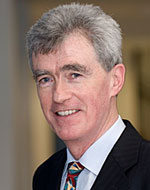 Shane Ward is Professor of Biosystems Engineering at University College Dublin. He was previously Head of the UCD School of Agriculture, Food Science and Veterinary Medicine (including Biosystems and Food Engineering) and a member of the university’s Senior Management Team (SMT). He has published in excess of 200 peer-reviewed research journal papers and conference proceedings. He has led several national and international research projects, including ‘SafeMBM’ (safe disposal and utilisation of meat and bone meal in the context of minimising risk from BSE); EC FP4 ‘ECOWOOD’ (eco-efficient wood harvesting on sensitive sites); EC FP6 ‘SigmaChain’ (food chain traceability); and the current H2020 AgroCycle (agri-food ‘circular economy’). He is currently ‘Scientific Director’ of CONSUS, the ‘flagship’ €18 million SFI-Origin Enterprises Plc funded ‘digital agriculture’ research programme, based at University College Dublin. CONSUS is Europe’s largest ‘big data in agriculture’ university-based research programme, with a team of 70 researchers and access to extensive on-farm pilot and demonstration sites. Professor Ward has extensive international networks in the agri-food research and innovation domain, and is currently ‘coordinating chair’ of the EIP-Agri Focus Group 31, addressing the minimisation of waste on the farm, with particular emphasis on optimising operational efficiency through ‘digital agriculture’. Contact: shane.ward@ucd.ie
Shane Ward is Professor of Biosystems Engineering at University College Dublin. He was previously Head of the UCD School of Agriculture, Food Science and Veterinary Medicine (including Biosystems and Food Engineering) and a member of the university’s Senior Management Team (SMT). He has published in excess of 200 peer-reviewed research journal papers and conference proceedings. He has led several national and international research projects, including ‘SafeMBM’ (safe disposal and utilisation of meat and bone meal in the context of minimising risk from BSE); EC FP4 ‘ECOWOOD’ (eco-efficient wood harvesting on sensitive sites); EC FP6 ‘SigmaChain’ (food chain traceability); and the current H2020 AgroCycle (agri-food ‘circular economy’). He is currently ‘Scientific Director’ of CONSUS, the ‘flagship’ €18 million SFI-Origin Enterprises Plc funded ‘digital agriculture’ research programme, based at University College Dublin. CONSUS is Europe’s largest ‘big data in agriculture’ university-based research programme, with a team of 70 researchers and access to extensive on-farm pilot and demonstration sites. Professor Ward has extensive international networks in the agri-food research and innovation domain, and is currently ‘coordinating chair’ of the EIP-Agri Focus Group 31, addressing the minimisation of waste on the farm, with particular emphasis on optimising operational efficiency through ‘digital agriculture’. Contact: shane.ward@ucd.ie
Talk Title: The Role of Precision Agriculture in Achieving a ‘Circular Economy’ Across the Agri-Food Sector
The economic and environmental sustainability of the agri-food industry is contingent upon the implementation of an effective ‘circular economy’ across the sector. A key aspect of this is the need to ensure that agri-food systems operate as efficiently as possible, thereby minimising both the use of input resources and the production of waste. Precision agriculture provides a technology and associated systems that have the potential to integrate the operations on the farm with the objective of optimising crop yield with minimal impact on the environment. The fundamental basis on which precision agriculture operates is the ‘harvesting of data’ from a wide range of sources (viz. akin to ‘crowd sourcing’) and the use of these data to develop algorithms that ‘drive’ the optimisation protocols. AgroCycle is a European Commission funded Horizon 2020 project addressing the application of the ‘circular economy’ across the agri-food sector. It has identified a range of waste valorisation options designed to extract optimum value and use from agri-food waste streams. However, such valorisation options are contingent upon the input feedstock being ‘unavoidable waste’ or, in effect, by-products of the sector. By optimising production operations on the farm, precision agriculture has a central role to play in ensuring that such wastes are at least ‘quasi-unavoidable’. However, there are major barriers to implementing such fully integrated systems.



